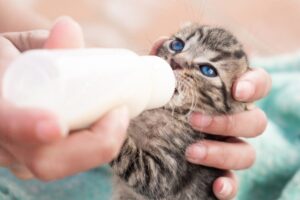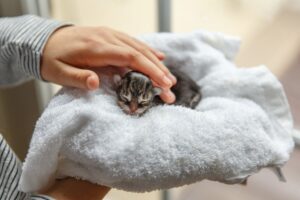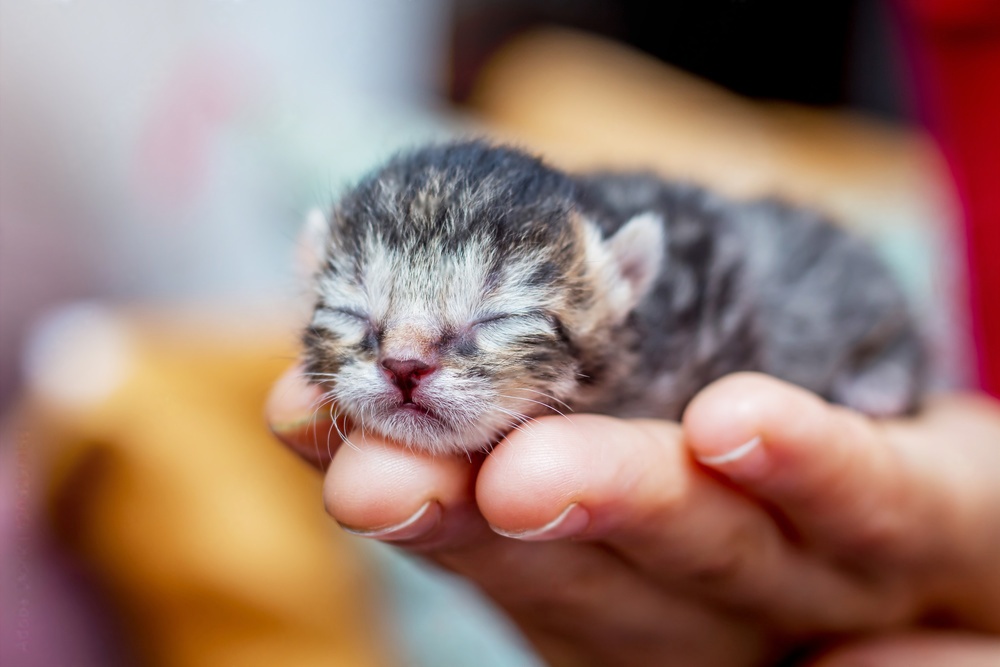Can a newborn kitten survive without a mother? Welcoming a newborn kitten into the world can be both a joyous and challenging experience. These tiny bundles of fur, born blind and deaf, rely entirely on their mother for survival during their early days.
However, circumstances sometimes arise where a newborn kitten finds itself without a mother’s care. Whether it’s due to abandonment, maternal illness, or tragic circumstances, finding yourself responsible for the well-being of a newborn kitten can be overwhelming.
A kitten is classified as a newborn within the first four weeks after its birth. Within this period, kittens are highly vulnerable and sadly, statistics show that the mortality rate for newborn kittens without their mothers, is alarmingly high, hovering around 40%. However, amidst this challenging situation, there’s hope. With proper knowledge and care, you can significantly increase the chances of survival for these vulnerable creatures.
In this blog post, we have revealed the essential steps and considerations for caring for a newborn kitten without a mother. From feeding techniques to warmth and vaccination, there’s much to uncover. So, Let’s dive in without wasting much time.
How to Take Care of a Newborn Kitten Without A Mother?
Taking care of a newborn kitten without a mother is a very daunting task because, at this stage, the kittens are still learning basic things: how to walk, how to vocalize (meow), and even how to regulate their body temperature.
The presence of their mother makes this learning stage successful because she provides the milk that boosts their energy and makes them fit to walk or vocalize and again, she shields them and provides warmth, making the environmental condition have little or no effect on them.
However, what happens when the mother is absent? Can anything be done to aid the newborn kitten through this pivotal period of growth? Fortunately, there are strategies and interventions available to support the well-being of a motherless kitten.
Below, we explore various methods to provide care for a newborn kitten in the absence of its mother.
1. Provide Warmth

One of the primary roles of a nurturing kitten mother is to provide warmth for her kittens but since the kitten is without a mother, you can step in.
One of the most effective ways to provide warmth for a kitten is by using the heating disk. A heating disk is a small, usually circular device designed to produce heat. It’s often filled with a material that can be heated and retains warmth for an extended period.
You can place the heating disk beneath your kitten’s beddings or near them to create a cozy and warm environment. Make sure the heating disk is not too hot by placing your hands to check to feel the temperature.
If you are on a budget and can’t purchase the heating disk, you can make a little nest with thick materials that can conserve heat for the kitten to lay its fur.
2. Provide food for the Kitten.

Caring for a newborn kitten entail ensuring they receive proper nourishment. The diet you provide for your kitten should be rich in essential nutrients tailored for their delicate stage.
Avoid using a spoon in feeding your kittens, instead opt for bottle feeding, as this method closely mimics natural nursing, allows for controlled feeding, provides comfort and warmth, ensures hygiene, and promotes bonding between caregiver and kitten.
It’s crucial to maintain a strict feeding schedule, offering nourishment every 3-4 hours initially. As your kitten matures, you can transition to a regular feeding routine.
Concerning the type of milk or food you’ll be giving to your kitten, it’s best to consult with a veterinarian about this. He will help you to determine the optimal feeding formula tailored to your kitten’s specific needs.
3. Stimulation
Just like feeding, newborn kittens cannot defecate on their own without proper assistance. So, you would need to find a way for them to urinate and excrete.
Mother cats typically stimulate their kittens to urinate and defecate by licking them. However, you can’t do this but one thing you can do to stimulate them is by rubbing their genitals with warm and damp clothes or cotton balls after every meal. If the kitten’s elimination process is not done frequently, they might become sick.
4. Regular Checkup
To keep your kitten’s health in check, regular checkups are very important. I would advise taking the kitten to your vet during the first week it is in your care. The vet will run some tests, examine the kitten’s health, recommend suitable foods that can aid the kitten’s growth, and also enlighten you on other important aspects.
He may also place the kitten on a routine vaccination and parasite prevention vaccination.
Additional Ways to Take Care of a Newborn kitten without mother.
Provide a Safe Environment

Creating a safe environment for a motherless newborn kitten is essential for its well-being. Here’s what you can do:
- Warmth: Ensure the area where the kitten stays is warm, as newborns cannot regulate their body temperature. Use a heating pad set on low or a hot water bottle wrapped in a towel. Monitor the temperature closely to prevent overheating.
- Quietness: Keep the environment quiet to minimize stress on the kitten. Avoid loud noises or sudden disturbances.
- Safety: Choose a safe space away from hazards such as other pets, electrical cords, or small objects that the kitten could swallow.
- Comfort: Provide a cozy nest for the kitten to rest in. A small box or carrier lined with soft blankets will provide a sense of security.
Monitor The Health of the Kitten
Monitoring the health of a newborn kitten without a mother is crucial to catch any issues early. Here are some key points to consider:
- Daily Observation: Observe the kitten’s behavior closely, including eating habits, energy levels, and toileting. Look out for any signs of illness such as lethargy, diarrhea, vomiting, or difficulty breathing.
- Weight Monitoring: Weigh the kitten regularly (daily or every few days) to track its growth. A sudden loss of weight could indicate health problems.
- Consult a veterinarian: If you notice any concerning symptoms or are unsure about the kitten’s health, don’t hesitate to contact a veterinarian. They can provide guidance and may recommend bringing the kitten in for a check-up.
Gradual Weaning
Weaning is the process of transitioning a kitten from milk to solid food. Here’s how you can do it gradually:
- Introduction of Wet Food: Around 4-5 weeks of age, start introducing wet kitten food mixed with formula. Offer small amounts on a shallow dish or your finger.
- Decrease Formula: Gradually decrease the amount of formula you feed the kitten while increasing the amount of wet food offered. Monitor the kitten’s response and adjust the ratio accordingly.
- Solid Food Transition: Over time, the kitten will become more accustomed to eating solid food. You can gradually transition to offering only wet or dry kitten food, depending on the kitten’s preference and ability to chew.
Consider Adoption
If you’re unable to care for the kitten long-term, consider the following steps:
- Reach Out to Shelters or Rescues: Contact local animal shelters or rescue groups to inquire about their foster or adoption programs. They may be able to assist in finding a suitable home for the kitten.
- Screen Potential Adopters: If you find potential adopters, take the time to screen them carefully to ensure they can provide a loving and responsible home for the kitten.
- Follow Adoption Procedures: Follow the adoption procedures set by the shelter or rescue group, which may include filling out an application, conducting interviews, and possibly home visits.
- Ensure a Smooth Transition: Make sure the kitten’s transition to its new home is smooth by providing information about its care, feeding, and medical history to the new owner.
Conclusion
While the absence of a mother poses challenges, proper care can significantly improve a newborn kitten’s chances of survival without a mother.
By providing warmth, and nourishment through bottle feeding, assisting with elimination, and regular veterinary check-ups, you can help nurture these vulnerable creatures through their early stages of life, offering them a chance to thrive despite the absence of maternal care.
Frequently Asked Questions
How Long Can a Kitten Go Without Eating?
A kitten cannot go more than a few hours without feeding. They often depend on their mother for food. Kittens who are four weeks old can stay for a day without food. However, they would feel extremely tired and malnourished.
What Do you Feed a Sick Kitten that won’t Eat?
If a sick kitten won’t eat, try offering it a high-calorie, nutrient-rich kitten food or specialized recovery formula. Warm the food slightly to enhance its aroma and appeal. You can also try hand-feeding the kitten or using a syringe without a needle to administer small amounts of food directly into its mouth. If the kitten continues to refuse food, seek immediate veterinary attention as a prolonged lack of appetite can worsen the kitten’s condition.
How do you Help a Newborn Kitten that Can’t Breathe?
If your kitten is having difficulty breathing, the best thing to do is to consult with your veterinarian immediately. Difficulty breathing in kittens is usually caused by infectious diseases affecting the lungs or windpipe.
Do Mother Cats Know When A Kitten is Missing?
This depends on the number of offspring she produces. If a mother cat produces more than 5 children, she may not realize when one is missing. However, if she has less than five offspring, she would notice when a kitten is missing.







Leave a comment